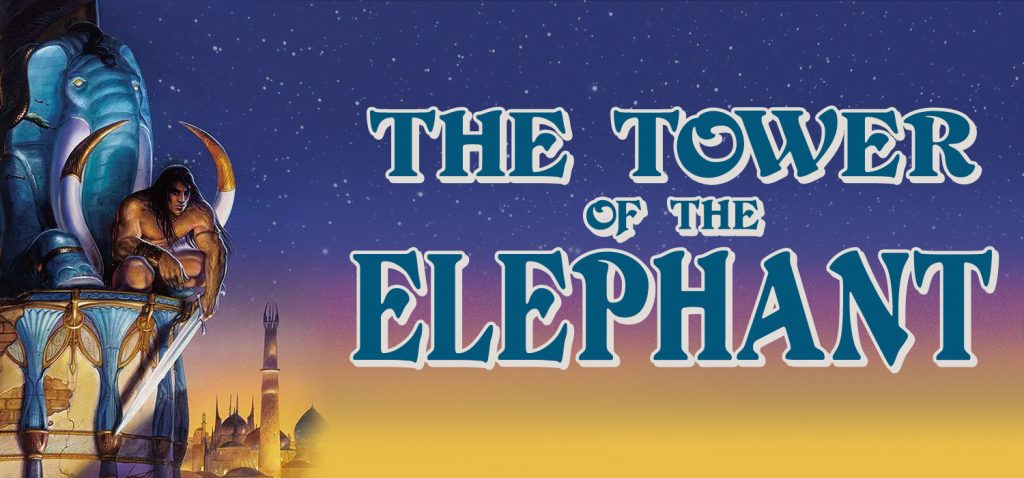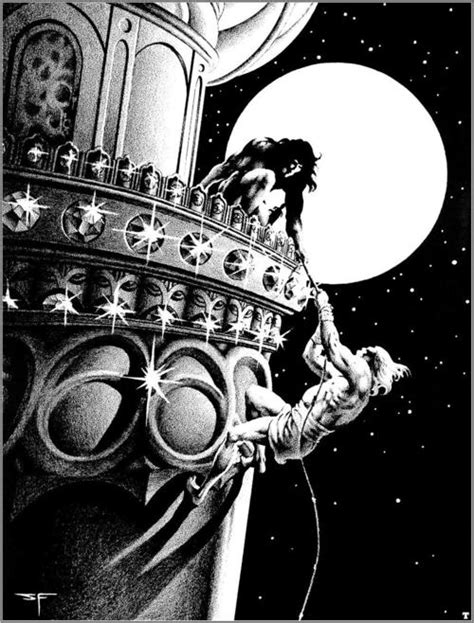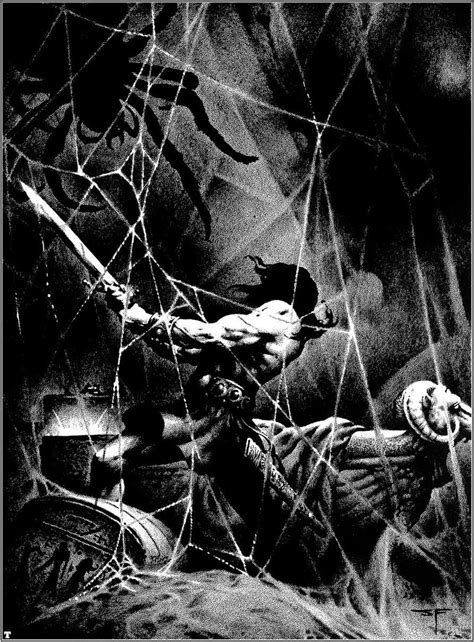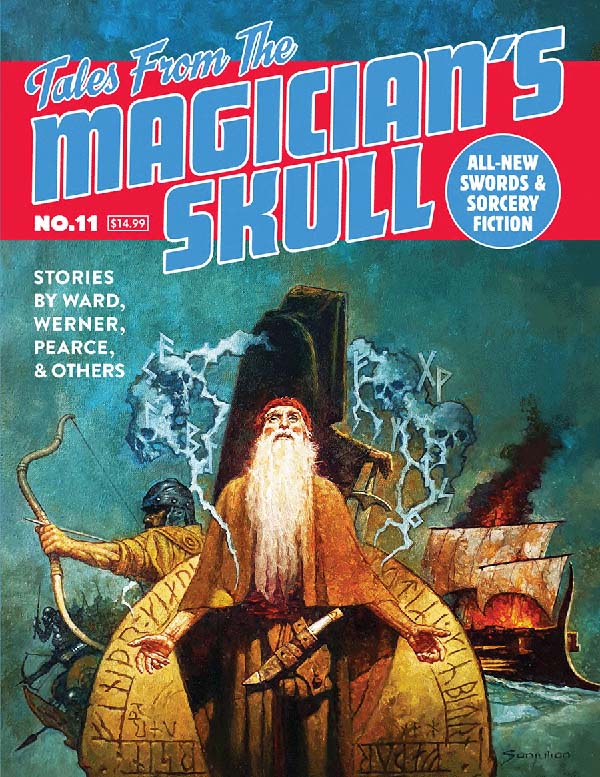Short Sorcery: Robert E. Howard’s “The Tower of the Elephant”
by Bill Ward
“Civilized men are more discourteous than savages because they know they can be impolite without having their skulls split, as a general thing.”
– Robert E. Howard, “The Tower of the Elephant”
The above is one of the most famous lines Robert E. Howard ever wrote, and it occurs as a young, somewhat naive Conan is mocked by a group of city dwellers in the opening scene of “The Tower of the Elephant.” As an introduction to both the story itself, and the character and themes of Conan in general, that opening scene is perhaps unsurpassed in the overall saga. Indeed in this, the fourth Conan story Howard wrote, everything that is indicative of the series is on display and firing on all cylinders – exotic cosmopolitan settings, ferocious action, weird sorcery, a sense of deep time history, propulsive pacing, and a stark contrast between the barbarian and the civilized man.
One of those civilized men is a fat Kothian slaver whom Conan engages in conversation, curious about the secret of the Elephant Tower that dominates the city of Zamora, a secret in the form of a jewel of incomparable value. The slaver mocks the young Conan’s ignorance, and also his confidence, and Conan is a bit slow on the uptake as the Zamoran thieves surrounding them join in on the fun. Our Cimmerian gets the hint and is ready to walk away when the Kothian fool just has to take things one step too far and pushes him. Conan proceeds to Conan, and the ‘woman-stealer’ gets his final etiquette lesson in the form of a bellyful of blade steel. In this one scene we have the essential nature of Conan contrasted with city swine he encounters, we get hints about the mysterious Elephant Tower and its black-hearted occupant, but we also get a thematic set up for the climax of the story. It isn’t a shifty thief, or a venal merchant, or a brutal mercenary that Conan kills, but one who enslaves others to enrich himself. The Kothian slaver is the ant-scale reflection of the ancient evil that is Yara, master of the Tower, proof the sins of a civilization that yokes and coerces those within its power echoes through all levels of its hierarchy of exploitation. Our noble savage, unburdened by philosophy or the civilized world’s religion, reacts with a disgust that demonstrates his intrinsic decency.
But Conan is a mere fledgling in Zamora, not only perplexed by the ways of the city, but relatively untutored in his profession of thief. The next civilized man he encounters is in the very gardens of the Tower itself: Taurus of Nemedia, Prince of Thieves. He’s an extraordinarily memorable character despite his very short appearance in the saga. Taurus is strong and nimble like Conan, but he’s also got a head full of experience and a bag full of tricks. When Conan suggests Taurus has made a mistake by leaving the body of a guard out in the open, the latter quickly explains the method to his madness. To scale the slick-sided round tower with sides like polished glass, Taurus has what may well be a magic rope. To take care of the silent lions of the garden, he has the lethal powder of the yellow lotus. But Conan has something too, something that no one else the length and breadth of the entire saga has. In a much later story, “A Witch Shall Be Born,” Conan himself comes close to saying just what that is, what elemental force flows through him as a being more in tune with nature, more natural and instinctual in his every act, than any flaccid denizen of the city, when he explains to the man who had (literally) crucified him and whom he, in turn, has crucified: “you civilized men are soft; your lives are not nailed to your spines as are ours. Your fortitude consists mainly in inflicting torment, not in enduring it. You will be dead before sundown.”
Thus when the lion of the garden that had not died from Taurus’ poison cloud springs like murderous lighting at the two as they contemplate climbing the wall, only Conan’s reflexes, his un-dulled instincts, save them. Taurus, who seems to admire Conan’s pluck in having simply decided on a whim to undertake a theft that the Prince of Thieves himself had spent months preparing for, is stunned, for the Cimmerian is something other than merely skilled, his very life’s rhythm beats outside the bounds thought possible by even the most accomplished and hardened of civilized men.
And this revelation is immediately reinforced when the two achieve the Tower’s top, and Taurus slips ahead inside, only to stagger back out again and drop cold dead. We can never really know if the Nemedian had intended to betray Conan in this moment – the latter’s suspicions may have been founded, or they may be a sign that the young savage is quickly learning the habit of distrust born of his new environment – but the result of course is to set up suspense for the next encounter. It also further reinforces the theme of the difference between Conan and everyone else. The civilized men in the Maul laughed at the very notion of breaking into Yara’s tightly guarded, mysterious tower. The best thief the civilized world has produced made the attempt after meticulous preparation and a lifetime of experience – and he dies simply opening a door.
Beyond the door is a fabulous treasure room, and the deadly giant spider that slew Taurus. The ensuing fight is top notch tense action, in which the man with animal instincts and the beast with the low-cunning of a human engage in move and countermove from which Conan barely emerges unscathed. While outside in the garden Conan faced creatures of this world, here, in a wizard’s tower, we get our first real taste of the uncanny in a foe that comes closer to killing the Cimmerian than any other in the story.
This uncanny encounter sets up the penultimate and central scene of “The Tower of the Elephant”, Conan’s discovery of the true secret of the Elephant Tower. For there, locked in its heart, the impossible form of the elephant-headed giant that Conan at first assumes to be a bizarre and exotic idol, turns out to be an imprisoned and abused being of another world, a long-lived, powerful alien who has been tortured for his secrets and forced to use his powers for Yara.
“That he did not instantly explode in a burst of murderous frenzy is a fact that measures his horror, which paralyzed him where he stood. A civilized man in his position would have sought doubtful refuge in the conclusion that he was insane; it did not occur to the Cimmerian to doubt his senses.” No Lovecraftian protagonist he, whose bow tie might fly off at the first sight of a tentacle or some non-Euclidean geometry, no; Conan stays sane even when overwhelmed. He regains his senses:
“Conan’s gaze strayed to the limbs stretched on the marble couch. And he knew the monster would not rise to attack him. He knew the marks of the rack, and the searing brand of the flame, and tough-souled as he was, he stood aghast at the ruined deformities which his reason told him had once been limbs as comely as his own. And suddenly all fear and repulsion went from him, to be replaced by a great pity. What this monster was, Conan could not know, but the evidences of its sufferings were so terrible and pathetic that a strange aching sadness came over the Cimmerian, he knew not why. He only felt that he was looking upon a cosmic tragedy, and he shrank with shame, as if the guilt of a whole race were laid upon him.”
Here is Cosmic Horror flipped on its head – humanity, still insignificant in this equation but oblivious to and uncaring of the implications of that – abuses and parasitizes the fantastic alien other and perverts it to its own cruel, petty, tyrannical will. It is Yara, a priest, who has done this – Yara who studied at the foot of the Elephant God before enslaving it, who learned the wondrous secrets of history and time that Conan only receives a mere whiff of, but whose thirst for power drives him to enslave and torture. Conan’s instincts again come into play – but not to fight, not to dodge a spider’s sticky strand or to wheel on an unseen assailant. No, it’s his instinct for decency that bypasses all thought or reason, and the barbarian does what the suffering ancient asks of him.
This is the ultimate act of the Noble Savage, the final demonstration of the difference between Conan and those who would call themselves his betters. No doubt Taurus would have taken the jewel beyond price from the Tower and escaped – Conan assists the enslaved being in freeing itself, and in exacting justice from its tormentor. The deaths Conan has caused that evening are something the Elephant God himself sees, knowing there is blood on Conan’s hands, and those acts themselves almost feel as if they were part of a ritual progression that lead from the winesinks of the Maul to the heart of the Elephant Tower – Conan kills man, then beast, then monster and, finally, god.
But this final act of killing isn’t a boss-battle combat, instead it is an act of mercy and liberation. Cutting the heart from the alien, Conan bathes the fabulous jewel of power in the creature’s blood, which it absorbs like a sponge. Presenting the jewel to Yara – the third and final civilized man Conan encounters in this story — he utterly destroys the vile priest, the villain shrinking away into the microscopic as his stolen power is returned to the jewel. The radiant Elephant Being – for he truly is no god, in his own words, but nor is he something we can understand – is reborn to ascend once again on cosmic wings. The jewel is destroyed, the tower is destroyed, and the penniless wanderer in a loincloth departs no richer than when he came.
No richer, that is, in terms of jewels or gold, none of which ever stay in Conan’s hands for very long, anyway. This fast-paced story of an imaginative heist turns out to be even more than it first appears, verging almost on a parable of a young man navigating an impure world and choosing to remain true to his humanity. In rejecting the temptation of riches and power, in extending compassion to something completely alien, and in acting as the vessel for a righteous vengeance on a malicious evil Conan emerges as a blood-spattered avatar of cosmic justice.
In light of that, it feels almost inevitable that he’d one day go on to be crucified – and return.








